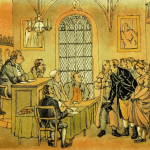Paul can sound like the Solomon of Proverbs: “Be careful how you walk, not as unwise men but as wise, making the most of your time, because the days are evil. So then do not be foolish but understand what the will of the Lord is” (Ephesians 5:15–17). Wisdom and folly are stark opposites. Choose one and you live; choose the other and you die.
But the cross has disturbed Paul’s Solomonic wisdom. Sometimes, it’s not “Be wise, don’t be a fool.” Rather: Seek the folly of God.
That’s the message to the Corinthians. Paul’s gospel is foolishness to the Greeks (1 Corinthians 1:23). But it’s not just the Greeks who find the gospel folly. Paul calls the gospel “the foolishness of God (1:25), though he immediately adds that this divine folly is “wiser than men” (v. 25).
The gospel is folly, and it assembles a company of fools: “God has chosen the foolish things of the world to shame the wise” (1 Corinthians 1:27). Fools like Paul himself, who doesn’t boast of strength or prowess or success, but boasts of his weakness and tribulations. “Indulge me in a little folly,” he tells the Corinthians (2 Corinthians 11:1, 16), before going on to recount his apostolic resume of failure—labor, imprisonment, beatings, lashes, stoning, shipwreck, dangers, dangers, dangers, dangers, dangers, dangers, dangers, dangers (2 Corinthians 11:16–27; eight dangers [kindunoi], for those who are counting).
Let the Corinthians boast of their prudence. Paul exults in being Christ’s fool (1 Corinthians 4:10).
The choice is not wisdom vs. folly. Rather it’s a choice between follies. One can choose the short-term wisdom of anthropic folly, or the short-term folly of divine wisdom; the folly of success or the folly of the cross.
In short: You’re gonna be a fool, and the only question is, Whose fool are you gonna be?















